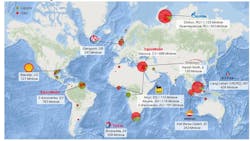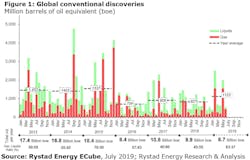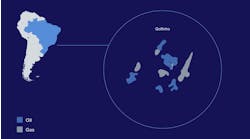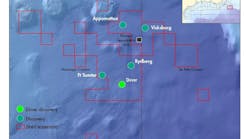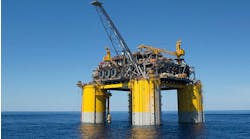Offshore staff
OSLO, Norway – Global discoveries of conventional oil and gas totaled 6.7 Bboe in the first half of 2019, according to analyst Rystad Energy.
Average monthly discovered volumes were 1,123 MMboe, about 35% higher than the comparable figure of 827 MMboe in 2018.
So far, 2019 has been a year of gas discoveries, which hold a majority (63%) share compared to liquids, a phenomenon not seen since 2016, the analyst said.
Rohit Patel, senior analyst at Rystad Energy, said: “Offshore discoveries in Russia, Guyana, Cyprus, South Africa, and Malaysia are propelling what is already a very successful year for international E&P companies. With deepwater finds contributing half of the discovered volumes, it can be inferred that high-risk frontier plays in the deepwater are back on the map for explorers.”
Majors and integrated national oil companies, with their high-risk appetite and successes in frontier regions, accounted for more than 80% of this year’s discovered volumes. Rystad has identified 56 global conventional discoveries so far this year, 30 of which are offshore.
In the first half of 2019, Russia led the way in terms of total discovered resources, followed by Guyana, Cyprus, South Africa, and Malaysia.
Gazprom made two big gas discoveries in the Kara Sea off the northwestern part of West Siberia’s Yamal Peninsula – Dinkov and Nyarmeyskoye. Together, these discoveries hold nearly 1.5 Bboe of recoverable resources. Dinkov, the larger of the two fields, holds 1.1 Bboe of resources, making it the largest discovery so far this year.
Offshore Guyana, ExxonMobil’s spate of oil discoveries continues in the Stabroek block, with three major discoveries reported in 2019 – Tilapia, Yellowtail (oil), and Haimara (gas-condensate). These three fields could collectively hold almost 800 MMboe of recoverable reserves. ExxonMobil’s success rate in the 15 wells drilled so far on the Stabroek block stands at 86%. First oil from the block (Liza Phase 1) is expected in mid-2020.
Offshore Cyprus, ExxonMobil made the giant Glaucus gas discovery. The discovery is estimated to hold 700 MMboe in recoverable resources and is the second major find in Cypriot waters after Eni’s Calypso gas discovery, which has a similar resource size. ExxonMobil is lining up an appraisal campaign on this discovery in 2020. Eni and partner Total are also planning to begin a five-well drilling program off Cyprus later this year.
Total’s Brulpadda wildcat completed in February in block 11B/12B made a large gas-condensate discovery in the Lower Cretaceous Post-rift Paddavissie Fairway in South African deepwater. Total and partners in the block have reported that the discovery could hold 1 Bbbl or more. Results from PVT analysis and technical validation are still being assessed to confirm the resource size. Rystad currently estimates the discovery resource size at between 500 and 600 MMboe.
Four additional prospects – Luiperd, Platanna, Woudboom, and Blassop – have been de-risked within the fairway and a multi-well drilling campaign targeting oil in the eastern side of the fairway is expected to start on the block in early 2020. The campaign might be carried out in stages as the operational window in the area is limited to December to March. The Luiperd prospect, with a pre-drill resource estimate of more than 500 MMboe, might be spudded next, the analyst said.
Offshore Malaysia, PTTEP made a major gas discovery with the Lang Lebah-1RDR2 exploration well in the SK410B license. Rystad estimates the discovery could hold between 2 and 2.5 tcf. This is believed to be the largest discovery ever made by PTTEP as operator and is in alignment with Thailand’s national energy company’s strategy to expand its footprint in the region.
07/11/2019
